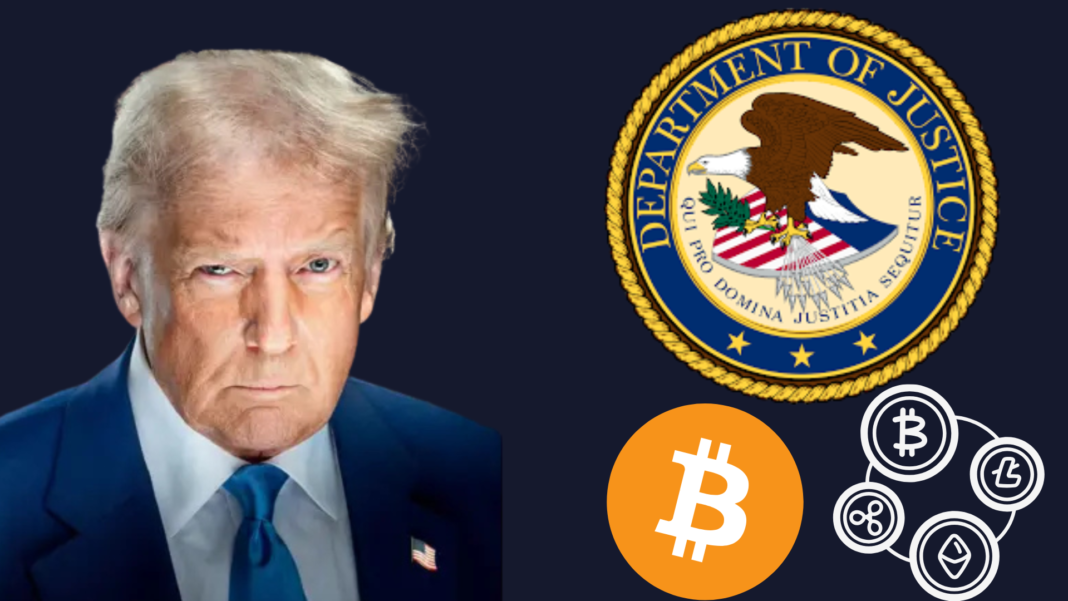In a landmark move reshaping the U.S. government’s approach to cryptocurrency, the Department of Justice (DOJ) has officially disbanded its National Cryptocurrency Enforcement Team (NCET).
The unit had been central to investigating digital asset-related crimes, including high-profile cases involving money laundering and illicit finance.
The decision was revealed through a four-page internal memo obtained by Fortune, issued by Deputy Attorney General Todd Blanche, who previously served as Donald Trump’s defense attorney.
The timing and language of the memo align closely with President Trump’s January executive order, which outlined a sweeping deregulatory strategy for the crypto industry.
Blanche’s declaration that “The Department of Justice is not a digital asset regulator” signals a stark departure from prior administrations’ aggressive enforcement posture and hints at a broader philosophical shift toward minimizing federal oversight of the crypto space.
Executive Order Sparks Immediate Overhaul of Federal Crypto Oversight
President Trump’s executive order, issued at the start of the year, called for a recalibration of the federal government’s involvement in the digital asset sector.
The order promotes a vision of “regulatory clarity” designed to foster innovation while avoiding what the administration characterizes as excessive governmental interference.
One of the most immediate and significant changes was the DOJ’s dissolution of NCET, a move that reflects a narrower enforcement focus.
Rather than investigating crypto infrastructure entities such as exchanges, mixers, or decentralized platforms, the DOJ will now pivot its efforts to prosecuting individuals who pose direct threats to investors, including scammers, hackers, and fraudsters.
The narrower enforcement lens is intended to reduce friction between government agencies and crypto companies, signaling a new chapter in digital asset policy.
Also Read: US Senate Repeals Crypto Tax Rule For DeFi Transaction Reporting Requirements, Bill Moves to Trump
Critics Warn of Enforcement Gaps and Increased Risk
Despite the Trump administration’s optimism, the decision to dissolve NCET has sparked concern among legal experts, former officials, and consumer protection advocates.
Critics argue that removing a specialized unit dedicated to tackling sophisticated crypto crimes could create enforcement blind spots in an already opaque and fast-evolving financial ecosystem.
The NCET had played a vital role in understanding and prosecuting complex schemes involving DeFi platforms, cross-border laundering, ransomware operations, and darknet marketplaces.
Without such a unit, some worry the DOJ may struggle to keep pace with increasingly complex criminal operations that exploit blockchain technology.
The move, while celebrated by some in the industry, could inadvertently embolden bad actors by signaling a loosening of oversight.
Also Read: Solana Price Falls Below $100 Following Market Jitters Sparked by Trump’s Global Tariff Announcement
Industry Applauds Deregulation, But Uncertainty Looms
The response from the crypto industry has been largely positive, with many stakeholders viewing the DOJ’s retreat as a long-overdue break from what they saw as “regulation through enforcement.”
For years, crypto firms have complained about being targeted by legal actions in the absence of clear rules, and many now see this policy shift as an opportunity to grow with fewer regulatory roadblocks.
However, the elimination of NCET introduces a degree of legal uncertainty, particularly concerning how existing laws will be applied and enforced moving forward.
Questions remain about how investor protection will be ensured, and whether this deregulatory momentum will lead to more innovation or increased market volatility.
As the Trump administration redefines the U.S. stance on crypto, the international community is also watching closely, with implications for cross-border regulation and global cooperation in fighting crypto-enabled crime.
Broader Trump Policies Stir Market Volatility and Mixed Crypto Forecasts
Meanwhile, broader developments under the Trump administration are sending mixed signals to the crypto markets.
On what traders have dubbed “Black Monday,” Bitcoin fell below the $75,000 mark amid rising economic instability driven by Trump’s aggressive tariff policies and escalating geopolitical tensions.
Ethereum plunged 19% as panic selling swept across markets, and concerns grew over increasing centralization in crypto infrastructure.
Yet, not all outlooks are negative. BitMEX co-founder Arthur Hayes has argued that Trump’s tariffs may ultimately drive a Bitcoin rally, predicting a weakened U.S. dollar will push investors toward Bitcoin and gold as alternative hedges.
These contrasting dynamics highlight the high-stakes environment now surrounding crypto, as the sector grapples with reduced regulatory scrutiny, unpredictable market swings, and the evolving geopolitical landscape under the Trump administration.
Also Read: Trump-Linked WLFI Project Plans USD1 Stablecoin Airdrop for Token Holders


